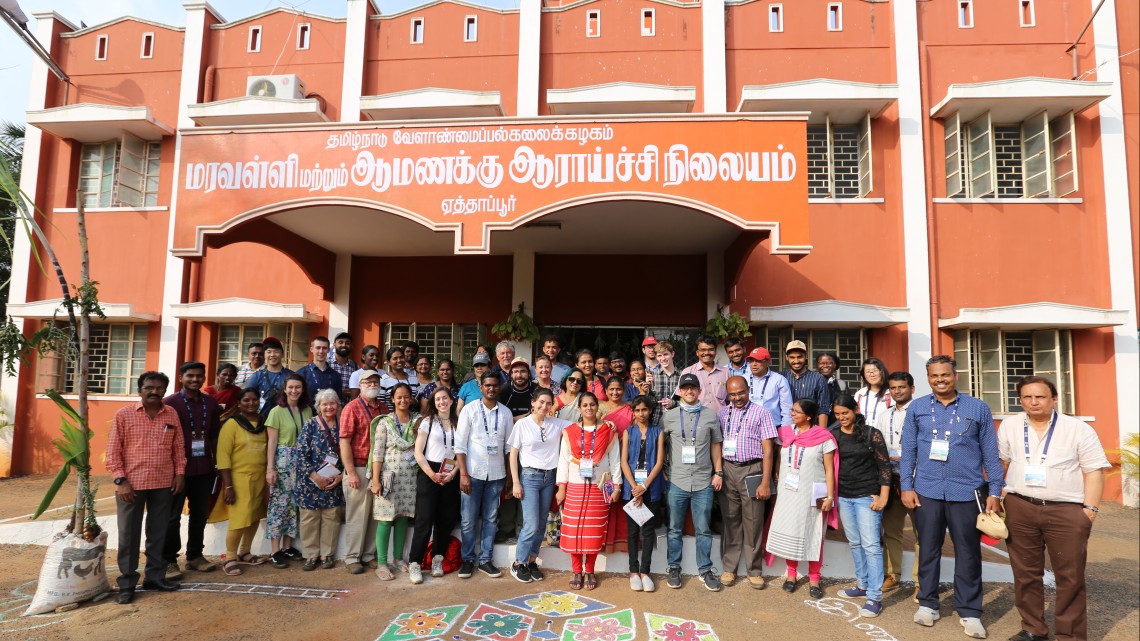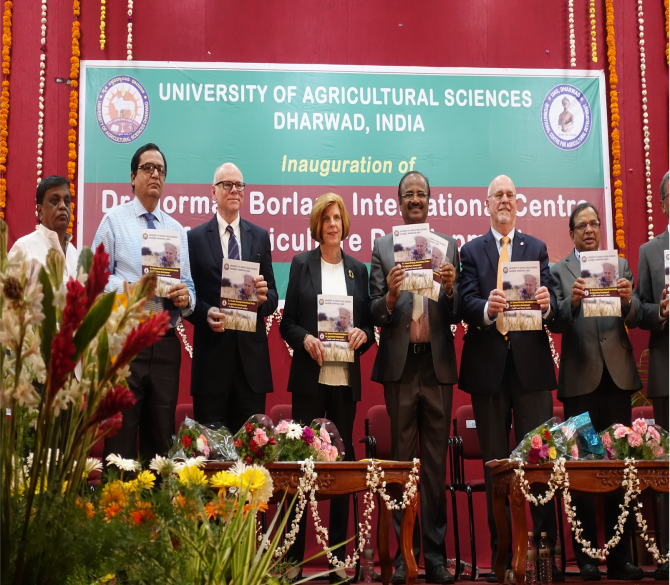
Cornell students spend three weeks studying with their counterparts in India as part of IARD 4020/6020.
News directly from Cornell's colleges and centers
Building international partnerships for global food security
By John Bakum
All around the world hunger, poverty and malnutrition are facts of daily life for hundreds of millions of people. The human toll is devastating and, in many places, worsening.
“Our grand global changes are inextricably linked to each other,” says KV Raman. “To face hunger, malnutrition and poverty, we need solutions that link together national and international organizations so that we can all work together.”
For Raman, a research professor in the College of Agriculture and Life Sciences’ Department of Global Development with a joint appointment in the Plant Breeding and Genetics Section in the School of Integrative Plant Science, the most effective way to solve complex global problems is through international partnerships.
He says, “I often refer to the proverb: If you want to walk fast, walk alone; If you want to walk far, walk together. It’s really the only way to initiate effective change.” That notion is embedded deeply in his professional career.
Raman works to develop and implement global partnerships for food and agriculture systems. Through his efforts he brings together Cornell students and faculty and partners in developing countries to form synergies and build solutions. These partners — scientists in agricultural universities, key players in the private sector, plus non-governmental organizations, civil societies and donors — collaborate across disciplines and geographies to forge new paths.
Trained as an entomologist and plant breeder, Raman began his research at the International Institute for Tropical Agriculture in Ibadan, Nigeria, along with early collaborations at Cornell and the International Potato Center (known as CIP for its Spanish-language acronym), in Lima, Peru. As CIP’s program leader of Integrated Pest Management, he published extensively and traveled across Latin America, Asia and Africa to develop and promote pest and disease resistant potato cultivars and sustainable integrated pest management practices. Technologies developed in his research reduced the use of insecticide on potatoes in some parts of the world by up to 90%.
Joining International Programs, College of Agriculture and Life Sciences (IP-CALS) in the early 1990s, Raman and others created what came to be one of the world’s largest networks promoting global work in sustainable agriculture.
“Cornell could never do all this work alone; it’s only through global collaboration that we can have meaningful impact in people’s lives, whether it’s students, farmers, executives, or faculty around the world,” Raman says.
His early research spurred projects such as the Cornell-Mexico International Late Blight Control partnership to control a disease threatening potato crops, the U.S. Agency for International Development (USAID) Agricultural Biotechnology Support Project II to commercialize genetically engineered crops in developing countries, and the Agricultural Innovation Partnership to enhance higher education in agriculture. From new pest and disease resistant varieties to new curricula developed in these projects, his innovations have benefited thousands of farmers, students and researchers. He’s now involved in a Bill & Melinda Gates Foundation-supported project to reform agricultural curriculum in select state agricultural universities of India, an effort requiring close consultation among faculty at Cornell and Indian universities.
For Raman, involving students in experiential learning is a key feature of his efforts. For more than 20 years, he along with several Cornell faculty has been leading the International Agriculture and Rural Development courses (IARD 4020/6020) which partner Cornell students with counterparts in India for classroom learning and a field trip to India during winter break. These courses have brought together over 600 students from Cornell and India in a shared curriculum. “The IARD class and its travel abroad has been a life-changing event for many students,” Raman says.
Another partnership helped forge an executive development program for business leaders and faculty from Asia, Africa and Latin America. Since its inception, more than 900 mid- and senior-level executives have taken the Seed Industry Development, Food and Agri-business Management program. “These are high-impact executives who take their Cornell training back to their home country with expanded skills that affect the entire seed and agricultural value chain,” Raman says.
His ongoing work and partnerships provide in-country support for Cornell Global Development students to engage in communities in India, Africa and Latin America, and he is working to grow existing partnerships with national and international agencies such as USAID, CGIAR and the Food and Agriculture Organization of the United Nations.
Looking ahead, Raman is exploring digital agriculture and supporting new courses and programs designed to foster climate resilient agriculture. “The COVID-19 pandemic has laid bare limitations of international work,” he says. “But by building capacity for digital agriculture in the developing world we can help overcome entrenched barriers that contribute to food insecurity and continue to make progress to meet together the challenges that unite us all.”
This article also appeared in the CALS Newsroom.
John Bakum is a communications specialist in the Department of Global Development in the College of Agriculture and Life Sciences.
Media Contact
Get Cornell news delivered right to your inbox.
Subscribe

